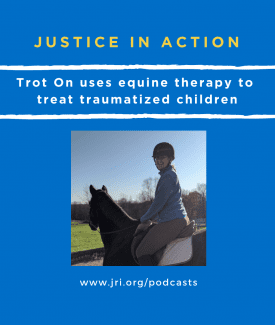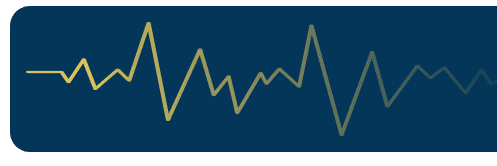
For a child who has suffered long-term trauma from abuse or neglect, the world doesn’t feel like a safe place. And children who suffer from such complex trauma often face challenges when it comes to forming relationships with others, acting out with anger or suffering silently from depression.
Enter Meredith Norton, a licensed social worker in Massachusetts, an equine-assisted therapist and riding instructor and lifelong horse lover. She is the director of JRI’s Trot On, an equine-assisted therapy program at Furnace Brook Farm in Marshfield, MA. Trot On matches young clients suffering from complex trauma with well-trained, tranquil horses to form relationships that teach those clients emotional regulation and self-control, empathy and communication skills.
“The human/animal bond is so important because it naturally supports (emotional) regulation and naturally supports helping calm stress levels,” Norton says. “Animals naturally reduce (people’s) stress hormones when they are interacting with humans.
Children suffering from complex trauma sometimes benefit from non-traditional forms of therapy — like equine-assisted therapy.
“Horses are living biofeedback machines,” Norton says. “If you’re calm and relaxed, your horse is going to reflect that in their energy….Horses are herd animals seeking that connection” with people.
Trot On is not only about riding. Clients learn to care for their horses, communicate with them verbally and non-verbally, and learn to read their horse’s cues and respond appropriately. Those skills can help heal a wounded child.
“Think of a young child learning development tasks — learning to walk, learning to read, learning to feed themselves — and all of the brain’s energy is going into forming those developmental skills,” Norton says. “But if they’re impacted by chronic stress, the brain is going to focus on safety responses, so the brain is going to develop differently in response to all that.”
Trauma can affect a child’s ability to form and maintain relationships, succeed in school, manage her emotional state and behavior toward others. Treating that trauma is essential to healing that child.
Riding is about movement and synchronization between horse and rider. That movement can help a child better understand the cues from her own body and her horse.
“Horses are living biofeedback machines,” Norton says. “If you’re calm and relaxed, your horse is going to reflect that in their energy….Being able to form a relationship with a horse who is non-judgmental, as all animals are, can be a lovely precursor to (forming) human relationships,” Norton says.
Learn about Trot On, JRI’s equine-assisted therapy program, by visiting them at https://jri.org /trot-on



Copyright Ⓒ 2025 JRI. All rights reserved. Privacy Policy. Language Accessibility Notice. Machine Readable File Links.